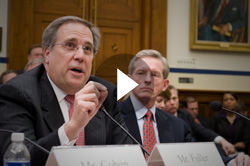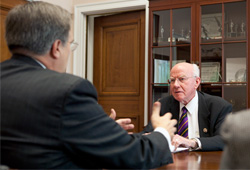 AOPA President Craig Fuller supports FAA funding bill in congressional testimony. Click here for a video of his testimony.
AOPA President Craig Fuller supports FAA funding bill in congressional testimony. Click here for a video of his testimony.
AOPA President Craig Fuller told Congress that AOPA members strongly support the new FAA funding (reauthorization) bill just introduced in the House of Representatives. Testifying on the sixth week of his presidency, Fuller reminded the House aviation subcommittee that he has flown for 42 years and understands first-hand what it means to be a general aviation pilot.
“The bottom line for us is that we support the measure, we support the use of aviation fuel taxes as a means of support from our segment of the aviation community,” Fuller said in his testimony Feb. 11. He noted that general aviation had agreed to do its share to support ATC modernization by accepting an increase in aviation fuel taxes, rather than user fees.
Unified front
He pointed out that, unlike past years, the entire industry supported the FAA funding bill.
“I think it is important and impressive that we are here today in agreement on FAA reauthorization,” said Fuller. “We’re all unified, all believing from our unique perspectives that the FAA reauthorization needs to go forward for a four-year period, not only to give certainty to the agency, but to give certainty to all of us who fly in the system, and who invest in system.”
In his prepared testimony, Fuller said that AOPA members strongly endorse a four-year authorization bill that provides much needed investment in safety, ATC modernization, FAA operations, airport improvements, and aviation research. Members also supported, “the time-tested system of passenger transportation and GA fuel taxes in combination with general fund revenues to support the FAA and the aviation system.”
 AOPA President Craig Fuller and AOPA Vice President of Legislative Affairs Lorraine Howerton meet with Transportation Committee Chairman Jim Oberstar (D-Minn.) before the hearing.
AOPA President Craig Fuller and AOPA Vice President of Legislative Affairs Lorraine Howerton meet with Transportation Committee Chairman Jim Oberstar (D-Minn.) before the hearing.
He praised Transportation Committee Chairman Jim Oberstar (D-Minn.) and aviation subcommittee Chairman Jerry Costello (D-Ill.) for their leadership in the last Congress that led to the agreement not to impose user fees. Prior to his testimony, Fuller held private meetings with Oberstar and other key members of Congress concerned with FAA funding.
“Everybody knows how concerned our members are about user fees,” Fuller said. “AOPA strongly supported the financing approach contained in H.R.2881,” the FAA funding bill that passed the House but stalled in the Senate during the last Congress.
 AOPA President Craig Fuller explains AOPA’s support for H.R.915 to aviation subcommittee member Rep. Vern Ehlers (R-Mich.)
AOPA President Craig Fuller explains AOPA’s support for H.R.915 to aviation subcommittee member Rep. Vern Ehlers (R-Mich.)
The new FAA funding bill—The FAA Reauthorization Act of 2009 (H.R.915)—is nearly identical to H.R. 2881. Reps. Oberstar and Costello introduced the new bill Feb. 10.
No new medical fees
During the hearing, Rep. Jerry Moran (R-Kan.) asked Fuller about fees for FAA services such as aircraft registration. He replied that while AOPA understand the existing fees, the association “would take exception” to the proposed new $42 fee for renewing a medical certificate.
New equipment, new rules?
Fuller endorsed the general concepts of the FAA’s NextGen Implementation Plan to modernize the air traffic control system using ADS-B (automatic dependent surveillance-broadcast). “That should lead to a proliferation of much-needed precision approaches at thousands of GA airports,” Fuller said. “The FAA should upgrade the level of ATC services at small airports to nearly the same quality as those found now only at large hub airports.”
But he noted that to get to that state, aircraft owners would have to make a significant investment in new avionics. He asked Congress for federal assistance for grants or tax breaks to owners to “jump start” equipage with new technology.
But he cautioned against changing the ATC service paradigm from “first come, first served,” to “best equipped, best served.” “Implementation of such a policy shift will require full participation from AOPA and the entire aviation industry to avoid conflict,” said Fuller.
Airport support
“As I travel to airports across the nation, I’m constantly reminded that airports are as critical to the aviation transportation system as on- and off-ramps are to our federal highway system,” Fuller told the Committee. “General aviation facilities are an important part of the U.S. infrastructure and should not be left out of any infrastructure imitative.
Fuller supported $16.2 billion envisioned in the bill for the Airport Improvement Program over the next four years, and the additional $3 billion for airports contained in the House economic stimulus package.
FAA Administrator
“I know this Committee is well aware of the importance of strong leadership at the FAA,” Fuller concluded in his prepared testimony. “AOPA believes that the next administrator must make unifying the aviation community a priority; should have technical and people management skills, including labor relations skills. And the next administrator must have an understanding of the aviation industry and the political acumen to lead the organization.”
Once the FAA Reauthorization Act of 2009 is approved by the Transportation Committee, other committees will hold hearings on the tax portion of the bill and other issues. Then the full House will vote on the legislation and send it to the Senate for approval.
The previous FAA authorization legislation expired last year. The agency has been operating under a series of temporary extensions. The current extension will expire March 31.


